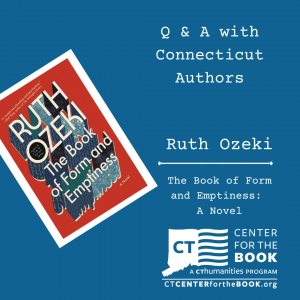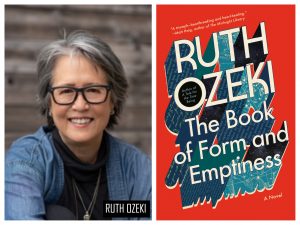Registration is open for the 2022 Connecticut Book Awards!
When: October 23, 2022 | 3:00-5:00 p.m.
Where: Hartford Public Library
Please note that clicking the button will bring you to another site for registration.
Q&A
COVID is still with us, although easing off a little, thank goodness. Did you have a favorite comfort genre to turn to when things were looking bleak? Something that lifted you away and to a different place for a while?
During the pandemic, I started collecting and reading books that I’d read as a young child, like Charlotte’s Web, Harriet the Spy, A Wrinkle in Time, and Once and Future King. From there I moved to authors I’d first encountered as a teenager: the contemporary authors of the 1970s, like Kurt Vonnegut, Angela Carter, Muriel Spark, A.S. Byatt, Gabriel García Márquez, and Jean Rhys, as well as some older friends, like Jane Austen and the Brontës. Rereading these authors and their novels acted like a tesseract, tessering me to King Arthur’s 5th century Britain or the Buendía family’s Macondo, and at the same time taking me back to my childhood in New Haven. During the pandemic, the present was hard to stomach, so time travel was my solace.
Where do you get your inspiration?
Everywhere. A one-sided cellphone conversation on the street. A snow globe that a friend brings back from the Bahamas. Jazz. A Chinese fortune cookie. And of course, books. I think books have a way of using us writers as hosts to aid in their reproduction. They’re sort of like parasitoid wasps, planting their DNA (i.e. inspiration) in our minds and waiting for us to start typing. Eventually, a new book is born, and the author dies, but her book (she hopes) lives on to find another host and reproduce again. Is this too creepy? I’m just kidding, of course. I get a lot of my inspiration from the mysterious workings of nature.
Who made reading important to you?
I was an only child of older academic parents, and in our house, reading was simply what a person did. If you weren’t eating or sleeping, you were reading, but even so, I routinely got scolded for reading under the covers or locking myself in the bathroom so I could find out what happened at the end of a chapter. I took flute lessons, and I remember propping Jane Eyre on the music stand and reading as I practiced scales and arpeggios. Parents in those days didn’t really play with children. My mother’s idea of play was to take me to the library and leave me in the children’s section in the basement, but I didn’t mind. In fact, it was heaven, and the children’s librarians were the angels, so kind, and they always knew what books I would like. They knew that reading was the most important thing, too.
What’s the last book that had you reading past your bedtime?
Piranesi, by Susanna Clarke. I was utterly mesmerized and couldn’t put it down. It is a fairly short book, so after I finished reading it on the page, I listened to the audio book, which is beautifully read by Chiwetel Ejiofor. I don’t say this often, but this is a book I wish I could have written. The mind-world Clarke has imagined, the language, the character’s voice, the haunting sense of place…just thinking of it now makes me choke up and want to read it again.
What did you want to be when you grew up?
Well, a children’s librarian, of course! I thought all the books in the library belonged to the librarians, who had so many, they didn’t mind just lending you any ones you wanted. They’d read them all, and I couldn’t imagine anything better than that, at least until much later, when it occurred to me that maybe writing the books would be even more fun.
What are you reading now?
I’m reading an advance copy of Demon Copperhead, by Barbara Kingsolver, which will be published in October. It’s a powerful retelling of David Copperfield, set in mountains of southern Appalachia at the start of the opioid crisis. The narrator, Demon, has an unsparing eye and a funny, caustic voice that makes me laugh even as he is breaking my heart. This is another book that is keeping me up way past my bedtime.
Bio
Ruth Ozeki is a novelist, filmmaker, and Zen Buddhist priest. She is the award-winning author of three novels, My Year of Meats, All Over Creation, and A Tale for the Time Being, which was a finalist for the 2013 Booker Prize. Her nonfiction work includes a memoir, The Face: A Time Code, and the documentary film, Halving the Bones. She is affiliated with the Everyday Zen Foundation and teaches creative writing at Smith College, where she is the Grace Jarcho Ross 1933 Professor of Humanities.
Synopsis
A boy who hears the voices of objects all around him; a mother drowning in her possessions; and a Book that might hold the secret to saving them both—the brilliantly inventive new novel from the Booker Prize-finalist Ruth Ozeki.
One year after the death of his beloved musician father, thirteen-year-old Benny Oh begins to hear voices. At first, Benny tries to ignore them, but soon the voices follow him outside the house, driving him at last to seek refuge in the silence of a large public library, where objects are well-behaved and know to speak in whispers. There, Benny discovers a strange new world….And he meets his very own Book—a talking thing—who narrates Benny’s life and teaches him to listen to the things that truly matter.









